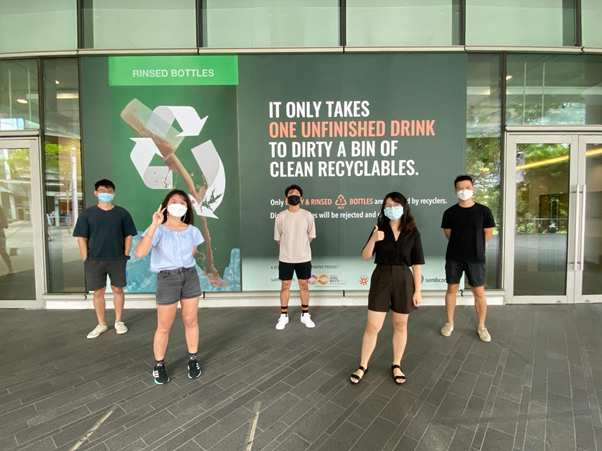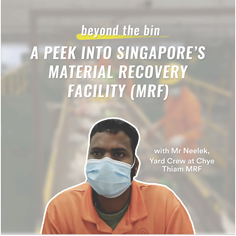RecyClean, a student group, led a publicity campaign partnering with the NUS Zero Waste Taskforce to tackle contamination within recycling bins in NUS UTown.

If you frequent or live in University Town (UTown), you might have seen these huge posters plastered around the area.

At first glance, it may be hard to relate to the caption, however this was what the team investigated to be one of the biggest culprits behind lower recycling rates: Contamination.
For example, up to 65% of cans deposited into a UTown can recycling bin could eventually be thrown away due to food and liquid waste contamination, according to the team’s investigation in a series of dumpster dives conducted.
In response, as part of the Zero Waste Testbed Initiative, RecyClean, a team of 5 students from various disciplines, kickstarted a month-long publicity campaign to tackle the issue of contamination in UTown’s recycling bins. The poster, designed by their team members, Yi Jing and Cindy from Industrial Design, was intended to illustrate the severity of liquid contamination – with a spilt drink literally breaking the recycling symbol.
Trashing Treasure
Food and drink wastes contaminate the recyclables in the recycling bins, which then makes them ineligible for recycling. Oftentimes, these dirty recyclables would eventually have to be discarded together with general waste.
Prior to the campaign, the team conducted a survey with 160 NUS staff and students. Unfortunately, nearly half of the respondents wrongly believed that items such as plastic straws and disposable plastic cutlery could be collected for recycling. Around half of the respondents were also unaware of what contamination in the recycling bin entails, and how severe it could get.
What then, could be done to end this wasteful situation?
Answering the “Why”s
Information on what can and cannot be thrown into recycling bins are already readily available to NUS campus users. But a question remains: ‘Why should we recycle clean?’ Recyclean delved into answering that.
The survey revealed that many did not know what happened to contaminated items. Approximately 20% of respondents wrongly believed that contaminated items would be washed at sorting facilities and bin centres when in fact, these items would actually be discarded together with general waste. The team acknowledged that prior to this project, they too, did not exactly know what happens to recyclables after chucking them in the recycling bins.
It was also brought up that the recycling system in Singapore seemed “to lack transparency” and it was hard to know about what was happening in these recycling bins, much less care about the entire recycling process.
In response to the findings, RecyClean launched a campaign consisting of interviews and infographics. The interviews featured the people working behind the scenes on social media and sought to shed light on the backend operations of recycling. Infographics were also designed to address some commonly asked questions: Why are some plastics collected for recycling and not others? Why does the system seem so complicated?

Through their campaign, RecyClean sought to demonstrate how one’s mindless actions can squander the genuine collective efforts by others – like how a single unfinished drink in a cup can waste the good efforts of many others to deposit clean recyclables, and how it complicates the work for those working behind the scenes.
Only a Stepping Stone
After the month-long campaign, the team consolidated their efforts and once again conducted an investigation on the items thrown into the recycling bins in UTown through 5 dumpster dives. The investigation revealed a 10% improvement in overall contamination rates at UTown, with a 30% improvement in contamination rates for plastics. The team was also ecstatic to discover one recycling bag that had no trace of contamination! The physical sight of the clean bag was definitely a huge validation of the team’s efforts.
The team members also acknowledged one of their key takeaways came from the data collection process. “The work of actually physically studying the contents of recycling bins instead of retrieving abstract numbers from previous studies really taught us about the practical challenges of data collection,” Gillian noted. “For example, we had to think about how to define and quantify the measurement of terms like ‘contamination’ as well as people’s ‘understanding’ of recycling.”
“Conserving the environment is definitely something we, as individuals, cannot do alone,” Gillian added, “however this publicity campaign is only one of many stepping stones we can take to attain our goal. Rather than a few people doing a lot, we need many people doing at least a little.” Although the campaign has concluded, the Zero Waste Taskforce have plans to redeploy similar publicity throughout the campus grounds later this year.
“RecyClean is one of the five project grantees of the Zero Waste Testbed Initiative grant call for 2021. Through this Initiative, we provide resources and the campus grounds for our students to put their ideas for sustainability into real world practice beyond the classroom, in hopes that they go on to be champions of sustainability in the workforce of their respective fields of study,” said Mr Loo Deliang, Chairman of the NUS Zero Waste Taskforce.
The Zero Waste Testbed Initiative is organised by NUS, SembWaste and South West Community Development Council (South West CDC), in support of the National Environment Agency’s ‘YES’ programme”, to empower and support youths in the co-creation of innovative solutions towards zero waste and circular economy through test-bedding of proof-of-concepts within the NUS campus.
Brought to you by:
RecyClean Project Team
& NUS Zero Waste Taskforce
—–
Interested in finding out more about zero waste efforts in NUS?
Check out the Zero Waste website for updates.


